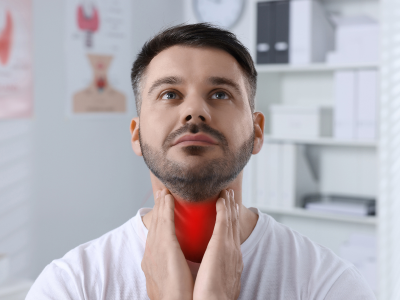 In January of 2023, Herb Abrams kicked off the new year with a start that no one enjoys – at the doctor with sudden abdominal soreness.
In January of 2023, Herb Abrams kicked off the new year with a start that no one enjoys – at the doctor with sudden abdominal soreness.
“For a few years, I thought I was just getting old,” Abrams said. “I had episodes of vertigo and constant aches, and I was always tired.”
After a few days of dealing with stomach pain, he’d had enough and saw his gastroenterologist to get to the bottom of it. To his surprise, the CT scan only found a benign cause for his discomfort and pointed to a much larger issue – calcification surrounding the vital areas of the heart.
“For the last fifteen years, my calcium levels have always been high. I also suffer regularly from kidney stones. Once, six years ago, after seeing a high calcium reading on my annual blood work panel, a physician’s assistant ordered a parathyroid hormone test. My levels were in the high range of normal, so nothing further was ever pursued.” noted Abrams. “I was told that there was nothing to worry about. This was a mistake, I now know. The parathyroid hormone levels were too high given the abnormally high calcium level.”
It wasn’t until this fateful day in January with some post-appointment investigation on his own that Abrams concluded he likely had primary hyperparathyroidism. His analysis was indeed correct, and, a month later, Abrams found himself at a clinic in Florida for surgery to remove the overactive parathyroid gland.
In the recovery room, he learned that, while the operation had been successful, there was likely a second adenoma or non-cancerous growth that hadn’t been removed due to its location lower down in the thoracic region. To make matters worse, he would have to find a new care team to handle the second phase of treatment since that type of surgery was outside the scope of the Florida clinic. The surgeon advised that the best surgical method would use the Da Vinci Robotic system.
“While doing my research to find another endocrine surgeon, I discovered Dr. Herb Chen’s personal email and saw that he had been the president of the American Association of Endocrine Surgeons. I figured he could recommend the best person to handle my case, so I reached out to him,” said Abrams. “He replied right away and said we can take care of you at UAB.”
Within a few days, Abrams was virtually introduced to Kelly Lovell, CRNP, who would guide him through the process of getting ready for his second parathyroid procedure.
“Kelly was amazing. She put everything in process, so I could get my operation over and done,” Abrams noted. “I realized I had stumbled into a really good place. Knowing that Dr. Chen and Dr. Wei had performed this same operation before, even though it was fairly rare, made me feel good.”
When it was time to arrive at UAB, Abrams was pleasantly surprised by how smoothly his preoperative tests and registration went. “Hospitals are not supposed to be this user-friendly,” he said.
His operation went smoothly, and, thanks to the minimally-invasive approach by Drs. Benjamin Wei and Chen, had a shortened recovery time that had Abrams back on the road to home in just 48 hours.
“I am so grateful I was able to find the right place and people,” he added. “I was struck by how wonderful everyone is at UAB.”
After a rocky start to 2023, Abrams is now back to his daily life, without the added risks from primary hyperparathyroidism. To those who are experiencing some of the symptoms of primary hyperparathyroidism including high blood calcium, he says that a parathyroid hormone test and a review of the results by an experienced practitioner are a must. There are plenty of online resources including a large Facebook group that are very useful.
“We’re certainly thankful that Mr. Abrams made the connection between his symptoms and was able to reach out for medical care,” says Chen. “We notice that many patients who have hypercalcemia, or high calcium levels, are often not flagged for further hyperparathyroid testing and often suffer with insistent symptoms for far longer without a clear diagnosis.”
If you suspect that you might have hyperparathyroidism, you can contact the UAB Division of Breast & Endocrine Surgery at (205) 934-3229 to schedule an appointment to speak with a provider.